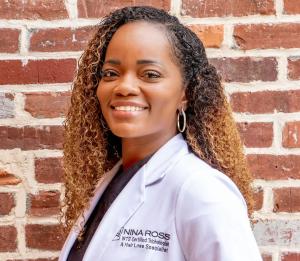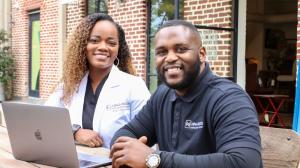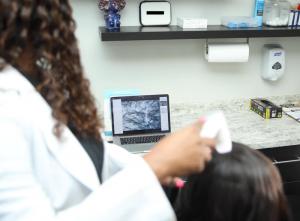Dr. Nina Ross, a Board Trichologist in Atlanta, explains Traction Alopecia: When is it too late
Dr. Nina Ross, a Board Certified Trichologist serving Atlanta, Georgia provides insight into when it may be too late to treat Traction Alopecia.
Traction alopecia is a type of hair loss that occurs when hair is pulled tightly, resulting in damage to the hair follicles and impeding their ability to produce healthy hair. This condition is frequently observed in individuals who wear tight cornrows, braids, or other hairstyles that exert significant pressure on the scalp.
𝐓𝐫𝐚𝐜𝐭𝐢𝐨𝐧 𝐀𝐥𝐨𝐩𝐞𝐜𝐢𝐚: 𝐖𝐡𝐞𝐧 𝐢𝐬 𝐢𝐭 𝐭𝐨𝐨 𝐥𝐚𝐭𝐞?
Regrettably, traction alopecia may not always be fully treatable. The primary reason that traction alopecia is considered to be an alarming condition is that it could be complicated to reverse the situation. Once your hair follicles sustain some damage, it may not be possible for them to grow into healthy hair. In some severe cases of traction alopecia, the damage could even extend to permanent hair loss. Dr. Nina, however, perceives it differently through her expertise.
She believes it is essential to remember that there is no thumb rule for timeline when it is too late to correct traction alopecia. The complexity of the situation and the incurred damage to your follicles will decide the probability of successful restoration. However, it is universally acknowledged that the earlier your traction alopecia gets diagnosed and treatment starts, the better chances you will have of reversing the damage. Therefore, it is imperative to consult a hair specialist who can accurately evaluate the condition and provide the most appropriate treatment plan. It is also important to:
𝟏. 𝐓𝐫𝐞𝐚𝐭 𝐲𝐨𝐮𝐫 𝐡𝐚𝐢𝐫 𝐠𝐞𝐧𝐭𝐥𝐲:
To prevent the progression of traction alopecia, it is vital to treat your hair gently and avoid hairstyles that exert excessive tension on the scalp, such as tight cornrows and braids. To avoid your traction alopecia from getting worse, it is vital to be gentle. Make sure that you avoid tight hairstyles such as cornrows and braids and anything that may pull your hair.
𝟐. 𝐌𝐨𝐢𝐬𝐭𝐮𝐫𝐢𝐳𝐞 𝐫𝐞𝐠𝐮𝐥𝐚𝐫𝐥𝐲:
Ensuring adequate moisture is another key aspect of hair care. Generally, dry hair is more prone as compared to well-moisturized hair to damage. You need to ensure that you keep your hair nourished and moisturized. However, as Dr. Nina Ross points out, it is essential to use holistic hair products that are specifically tailored to your condition.
𝟑. 𝐂𝐨𝐧𝐬𝐮𝐥𝐭 𝐚 𝐡𝐚𝐢𝐫 𝐬𝐩𝐞𝐜𝐢𝐚𝐥𝐢𝐬𝐭:
For individuals experiencing hair loss or concerned about traction alopecia, Dr. Nina Ross strongly recommends consulting a hair specialist. These professionals possess the expertise to guide patients through the treatment process and prevent the condition from progressing to a point where reversal becomes difficult or impossible.
Any symptom, if left unaddressed at any point, can have severe consequences, including permanent hair loss and damage to the hair follicles. It is of utmost importance to handle your hair with care and adopt preventive measures. This fact underscores the importance of taking preventive measures and seeking professional guidance at the earliest signs of hair loss or concerns related to traction alopecia.
𝐀𝐛𝐨𝐮𝐭 𝐃𝐫. 𝐍𝐢𝐧𝐚 𝐑𝐨𝐬𝐬
At Nina Ross Hair Therapy, good hair health is guaranteed through holistic treatments and therapies. By following the expert tips provided by Dr. Nina Ross, a highly regarded Board Trichologist in Atlanta, you can maintain the beauty and health of your hair. For more information about Dr. Nina Ross and her innovative and holistic methods to reverse hair loss, please visit her website at https://ninaross.co/ or call (678) 561-4522.
Dr. Nina Ross
Nina Ross Hair Therapy
+1 678-561-4522
Healthyhair@ninaross.co
Visit us on social media:
Facebook
Instagram
YouTube
Other
5 Reasons Your Hair is Growing Slow
Legal Disclaimer:
EIN Presswire provides this news content "as is" without warranty of any kind. We do not accept any responsibility or liability for the accuracy, content, images, videos, licenses, completeness, legality, or reliability of the information contained in this article. If you have any complaints or copyright issues related to this article, kindly contact the author above.



